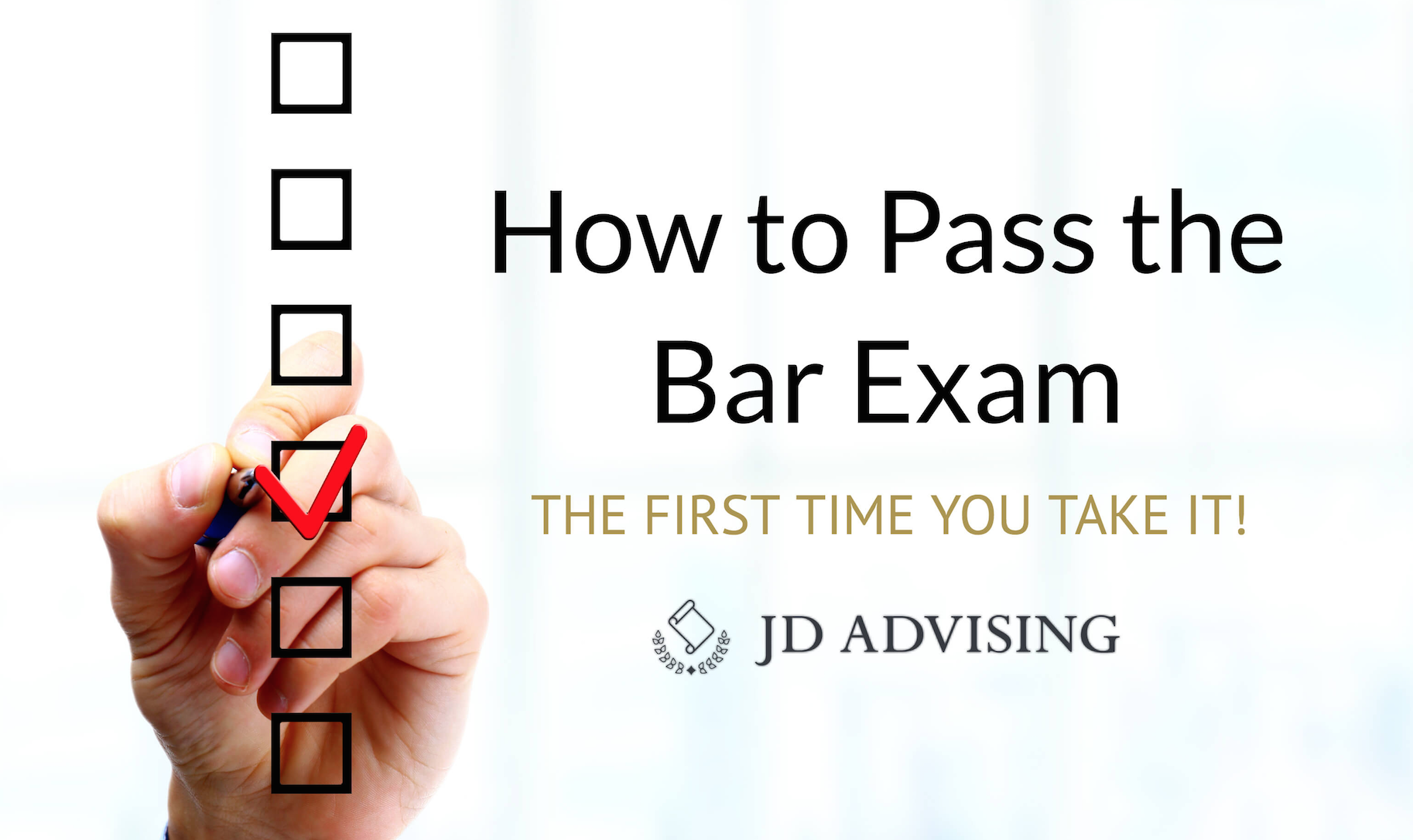Common First-Time Bar Exam Taker Questions
FAQ: Common Questions First-Time Bar Exam Takers Have
In this post, we cover some very common first-time bar exam taker questions. Read further to see if we answer any questions you may have about the bar exam! We have explanations as well as short videos to answer several of these common first-time bar exam taker questions!
Common First-Time Bar Exam Taker Questions
How many hours a day should I study?
We recommend treating studying for the bar exam like a full-time job and studying approximately 40 hours per week. You don’t need to study 12 hours a day, seven days a week. Instead, aim to study about 8–10 hours per day and feel free to take a day off each week. While you do need to take studying seriously and put in the time, you don’t need to lock yourself in a room and avoid all social interactions for three months. Use time off studying to reward yourself. Just be sure to exercise balance and use good judgment as to whether you have completed enough studying for the day/week before deciding to do something fun.
How many practice questions should I complete?
In our courses, we assign about 2,000 multiple-choice questions, and 50 essays (including performance tests). Even students who complete about 75% of these assignments generally still pass the bar exam. The goal is to get exposed to enough bar exam material but focus on quality rather than simply getting enough done. It would be much better to do 20 multiple-choice questions in a slow and methodical manner (i.e., by spending a long time dissecting them, grading your answers, and understanding what your strengths and weaknesses are) than zooming through 100 multiple-choice questions without taking time to dissect them or reflect on them!
If you break this down by a daily recommendation, we recommend that students complete, on average, 10–20 practice multiple choice questions and one to two essays (depending on the length of essays in your jurisdiction) per day. But instead of focusing simply on a number, look how you are spending your time. Overall, you should spend about half of your time (outside of lectures) memorizing, and the other half doing practice questions.
So, if you are studying for eight hours per day, that means you should be working on practice questions (both multiple-choice and essays) for about three to four hours per day on the days that you don’t have lecture. The exact number of questions you complete matters much less than the quality of time you spend.
Should I get a tutor during bar prep?
There are a lot of benefits that a tutor can provide to first-time takers. For instance, a tutor can teach you not only the confusing substantive aspects of the law, but can also show you how to study. A tutor can help guide you in creating a study schedule and understanding what things are (or are not) helpful as you are preparing for the exam. Tutors also have insight into how things have been tested in the past, explaining concepts in a way that is tailored to how those topics tend to be tested. Tutors can also assist with valuable skills such as essay writing and multiple-choice strategies that you may not otherwise be aware of.
While a private tutor can be an investment, students who have a lot riding on the bar exam may want to consider a tutor to ensure their best chances of success the first time taking the exam. Students who struggled in law school may also want to consider a tutor for the bar exam to help ease the burden of having to learn tons of information by oneself. (Note: we have an entire guide on hiring a bar exam tutor here.)
How do I manage my time during bar prep?
The first step to finding the time to complete everything that needs to be done during bar prep is to make a schedule. First, make a long-term schedule laying out which subjects you will cover each week to ensure that you allocate sufficient time to each subject (a commercial bar prep company will likely complete this for you). Next, make a weekly schedule. Lay out everything that you hope to accomplish that week (lectures to attend, outlines to memorize, practice questions to answer) and decide what you need to accomplish each day to complete those weekly goals.
Finally, make a daily schedule, incorporating details such as lunch breaks, time for exercise, and any other necessary personal activities that you have to take care of. During the times set aside for studying, try to eliminate outside distractions and focus on the material as much as possible to use your time as efficiently as possible. For more tips, check out 20 Ways to Save Time Studying for the Bar Exam!
Should I join a study group?
There are pros and cons to joining a study group to prepare for the bar exam. For instance, a study group can help provide insight and various viewpoints regarding complex areas of the law that you are attempting to understand. Additionally, a study group of other dedicated students can help provide motivation to keep you on track with your own studies.
On the other hand, a study group can be distracting. Getting together with your friends to study can quickly turn into a social gathering. Also, if the members of your study group turn the discussion into a competition of who did more (e.g., more hours studying, more practice questions, more flashcards, etc.) you can start to feel anxious and as if you are not doing enough. Study groups are not for everyone, so think carefully about how you best learn (and study) before agreeing to commit to a study group to prepare for the bar exam. A decent rule of thumb would be: if you had a study group in law school and that benefitted you—particularly if you would be studying with the same group—consider it for the bar exam. Otherwise, a study group is definitely not necessary. And, if you haven’t used one in the past, you probably don’t need it for the bar exam.
I am bad at multiple-choice. Will I fail the bar?
This is one of the most common first-time bar exam taker questions. The short answer is, no! Many students dread the multiple-choice portion of the bar exam, coming in with a preconceived notion that they hate or are bad at multiple-choice questions. First of all, there are many tips and tricks to multiple-choice questions on the bar exam to help ensure that you obtain the highest score possible. (See, for example, What to Do when You Are Stuck Between Two Answer Choices and What to Do if You Consistently Get MBE Questions Wrong.) We also have an entire guide on the MBE here.
Additionally, the multiple-choice portion is only half of the exam in the vast majority of jurisdictions and there is no minimum MBE score in most jurisdictions. Thus, in most jurisdictions, you can compensate for a low MBE score with a high written score. Check out How Much is the MBE Score Worth for more information!
Lastly, the multiple-choice questions on the bar exam are very well written. They may seem straightforward to you compared to questions you have answered elsewhere.
Should I aim to complete 100% of my commercial bar prep course?
You definitely want to put in the time necessary to pass the bar exam. However, remember that commercial courses are cookie-cutter courses designed to reflect what most students need. They do not necessarily reflect your exact individual needs. For example, if you received an A+ in your Evidence class, you probably don’t need to watch nine hours of Evidence lecture at a regular pace. You may be able to watch the lecture on double-speed (or skip it altogether!). On the other hand, if you didn’t even take Evidence in law school, you may need to dedicate the time your commercial course suggests you dedicate to Evidence and additional time. Maybe you need to watch the lecture more than once, complete more practice problems, or use supplemental resources to help you understand this tricky subject.
Many students make the mistake of making it their goal to complete 100% of their commercial course. They focus on checking off boxes without ever really asking themselves if they are making progress toward their real goal—which is to pass the bar exam!
Remember: the goal should not be to complete 100% of your course, but to pass the bar exam on the first attempt!
As you are completing your commercial course, think carefully about whether the assigned exercises are helping you to learn the material. If the answer is no, stop doing them! In the limited amount of time you have to study for the bar exam, your time is better spent on things that are helping boost your score rather than on busy work that is not contributing to your understanding or memorization of the material.
How do I learn everything I am supposed to learn?
There is no question that there is a lot of information to learn for the bar exam. It is easy to become overwhelmed and feel like you can never learn all the material. Start by making a schedule. Deciding in advance how much time you have to devote to each subject will (hopefully) prevent you from getting stuck on a subject for weeks and weeks (and then not have enough time to cover some of the subjects at all).
Next, focus on the highly tested material. It is practically impossible to learn every single thing that could possibly be tested on the bar exam. Focus on the MBE subjects (which are guaranteed to appear on the MBE portion on the exam, and possibly on the written portion of the exam) and on the highly tested subjects that are tested on your jurisdiction’s written portion of the exam. Within each subject, spend more time on highly tested topics. For instance, of the 25 MBE questions on Torts, 12–13 of those questions will be on negligence. Therefore, it is important to make sure that you spend time learning negligence and less time on less tested areas, for instance, the privacy torts. We discuss the highly tested areas of law on the MBE and on the essay exam in these free guides! Also, our MBE Guide goes over these highly tested areas in more depth.
Can I work while I am studying for the bar exam?
This another one of the common first-time bar exam taker questions. Ideally, you should try to take some time off to study for the bar exam. As mentioned above, studying for the bar exam should be treated as a full-time job. Your free time outside of studying should be spent on things that will help you mentally prepare for the exam, such as exercising and socializing. If you do have to work, though, try to limit your hours and/or take some time off if possible in the weeks leading up to the exam. Whatever time you can take off is beneficial, because it maximizes the likelihood that you will only have to take the bar exam once!
How expensive is it to take the bar exam?
We go into more detail in this post, but taking the bar exam is more expensive than you may think! For example, here are some of the bar exam expenses you should plan on:
- Registering for the bar exam with your state: $300–$1,300+
- Bar-related expenses (i.e., character and fitness, criminal history records, driving records, etc.): $100+
- Cost of a bar review course: $1,600–$4,000+ (on average)
- Exam software: $200+
- Bar exam accommodations (i.e., hotel, food, gas/plane ticket to travel to testing center): 0–$600+
- Living expenses/time off work (varies)
The bar exam is more expensive than students often think! The best thing to do is to prepare for this ahead of time!
Will my firm pay for bar prep?
In general, many big law firms pay for bar prep. They may pay a stipend, graduation bonus, or salary advance. Some pay for the bar exam course directly. Others will reimburse you for bar-related expenses. If you have a job lined up at a small or midsize firm, it is worth it to ask if they pay for bar prep. Some very small and midsize firms are happy to front this expense but others do not. It is important to ask up front so you know what your obligations are going into bar prep.
Go to the next topic, Bar Exam Resources: Popular JD Advising Resources for First-Time Bar Exam Takers.
Looking to Pass the Bar Exam?
Free Resources:
- 🌟Bar Exam Free Resource Center: Access our most popular free guides, webinars, and resources to set you on the path to success.
- Free Bar Exam Guides: Expert advice on the MBE, the MEE, passing strategies, and overcoming failure.
- Free Webinars: Get insight from top bar exam experts to ace your preparation.
Paid Resources:
- 🏆One-Sheets: Our most popular product! Master the Bar Exam with these five-star rated essentials.
- Bar Exam Outlines: Our comprehensive and condensed bar exam outlines present key information in an organized, easy-to-digest layout.
- Exclusive Mastery Classes: Dive deep into highly tested areas of the MBE, MEE, MPT, and CA bar exams in these live, one-time events.
- Specialized Private Tutoring: With years of experience under our belt, our experts provide personalized guidance to ensure you excel.
- Bar Exam Courses: On Demand and Premium options tailored to your needs.
- Bar Exam Crash Course + Mini Outlines: A great review of the topics you need to know!
🔥 NEW! Check out our Repeat Taker Bar Exam Course and our new premier Guarantee Pass Program!










Leave a Reply
Want to join the discussion?Feel free to contribute!